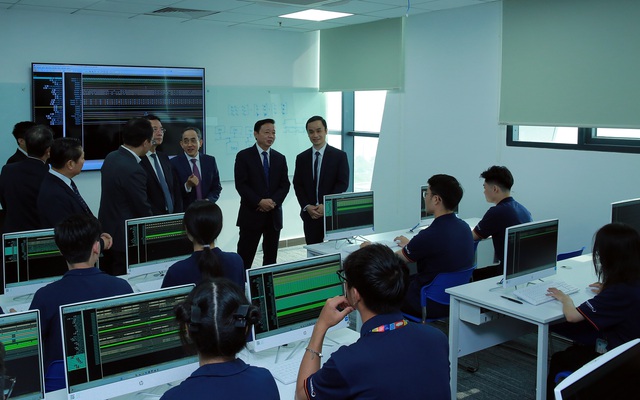Vietnam is positioning itself as a strategic destination in the global semiconductor supply chain, a move that hinges on its ability to rapidly build a deep pool of highly skilled talent.
Deputy Prime Minister Tran Hong Ha underscored the urgency of training a sizable cohort of engineers and specialists to meet the industry's burgeoning demands at an international conference on Vietnam's semiconductor human resources on May 4th.
The semiconductor industry is poised to become a trillion-dollar behemoth by 2030, driven by the proliferation of technologies such as artificial intelligence, the Internet of Things, 5G telecommunications, and advanced computing systems.
This burgeoning sector plays a pivotal role in shaping the global economy, propelling green transformation, digital transformation, and knowledge-based development.
Vietnam's Advantageous Position
Recognizing the immense potential, Vietnam has forged comprehensive strategic partnerships with most countries boasting developed semiconductor industries.
Notably, the comprehensive strategic partnership with the United States emphasizes breakthrough cooperation in innovation and high technology. Additionally, Vietnam signed a memorandum of understanding with the U.S. on developing the semiconductor industry ecosystem during President Joe Biden's visit in September 2023.
Leading semiconductor corporations, including NVIDIA, Intel, Samsung, and Synopsys, have expressed keen interest in Vietnam, affirming their commitment to research, investment, and establishing key production centers within the country.
Homegrown Expertise
Vietnam boasts a valuable asset in the form of a team of experts, leading scientists, and senior Vietnamese management personnel employed by the world's premier semiconductor chip enterprises.
Deputy Prime Minister Tran Hong Ha highlighted the significance of this homegrown expertise, asserting that it must be leveraged alongside domestic human resources to drive the nation's semiconductor ambitions.
"In the trend of shifting regional and global production chains, human resource training for the semiconductor IC industry not only serves the Semiconductor Industry Development Strategy and the needs of businesses in Vietnam but also needs to be part of the overall problem of the semiconductor chip industry and the global electronics industry," the Deputy Prime Minister noted.
To achieve its semiconductor aspirations, Vietnam must adopt a systematic and comprehensive approach to human resource development.
The Deputy Prime Minister underscored the need to recognize and swiftly address the "positioning" and "shifting" challenges of the global semiconductor race, with human resources being the critical determinant of success or failure.

Tailoring Training to Market Demands
Training programs must be tailored to market signals and international standards, avoiding overheated, rampant, and ineffective development.
The Deputy Prime Minister emphasized the importance of forecasting and evaluating human resource needs for both domestic and global markets, as well as aligning with the development trends of the electronics industry.
"Training human resources in the semiconductor industry requires meeting international standards and accessing advanced and modern technologies," he stated.
To build a robust talent pipeline, Vietnam must focus on the foundational elements of the semiconductor industry and chip design, such as STEM (science, technology, engineering, mathematics) disciplines encompassing physical sciences, materials, mathematics, chemicals, electronics, information technology, and system design.
Concurrently, the nation must attract high-quality human resources from external sources and promote training programs that convert bachelors and engineers from related fields, such as electronics, materials, physics, chemicals, and programming.
The Deputy Prime Minister proposed considering models akin to Phenikaa University, where science and technology centers and shared toolkits are established to facilitate collaboration between universities, businesses, experts, and scientists across the various stages of the semiconductor industry.
Addressing the Talent Shortage
Critically, Vietnam faces an acute shortage of instructors equipped with the necessary theoretical knowledge, practical expertise, and methodologies to train tens of thousands of high-quality semiconductor professionals.
The Deputy Prime Minister advocated for specialized training and coaching programs, creating conditions for trainers to transition, retrain, and strengthen basic training programs.
He called for input on policy packages and implementation conditions corresponding to each goal and task of semiconductor IC human resource training, underscoring the urgency of the matter.
A Promising Future
Despite the challenges, the Deputy Prime Minister expressed confidence in Vietnam's ability to play a prominent and prestigious role in the global semiconductor industry ecosystem. He acknowledged the participation of cities like Da Nang and Ho Chi Minh City in investing in infrastructure and human resources, laying the foundation for the industry's development.
"Vietnam wishes to strengthen cooperation with countries and territories in research, training and development of the semiconductor industry ecosystem; committed to creating the most favorable investment environment for businesses in general and enterprises developing semiconductor chip production in particular," he affirmed.
As the global semiconductor industry continues its transformative journey, Vietnam's strategic investments in human capital and infrastructure position it as an emerging force in this critical sector, poised to reap the rewards of a trillion-dollar opportunity.









 Google translate
Google translate